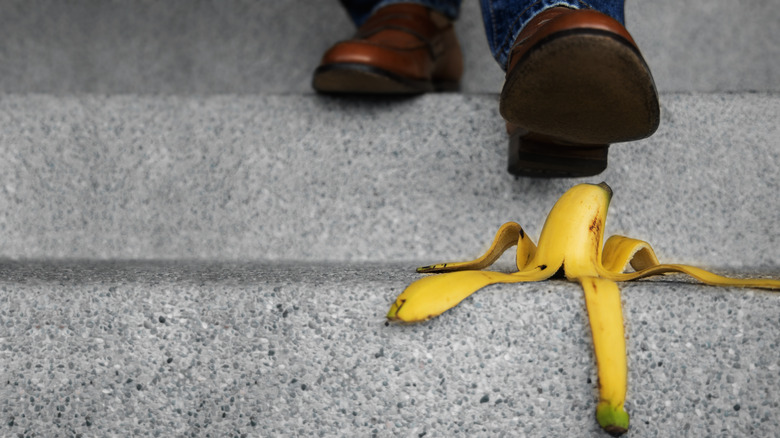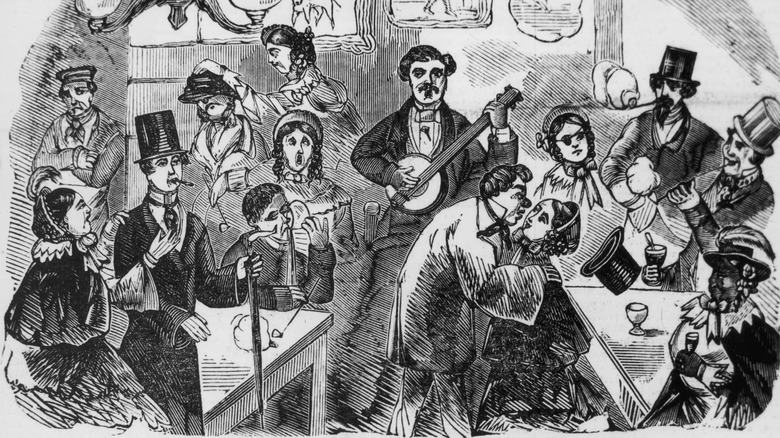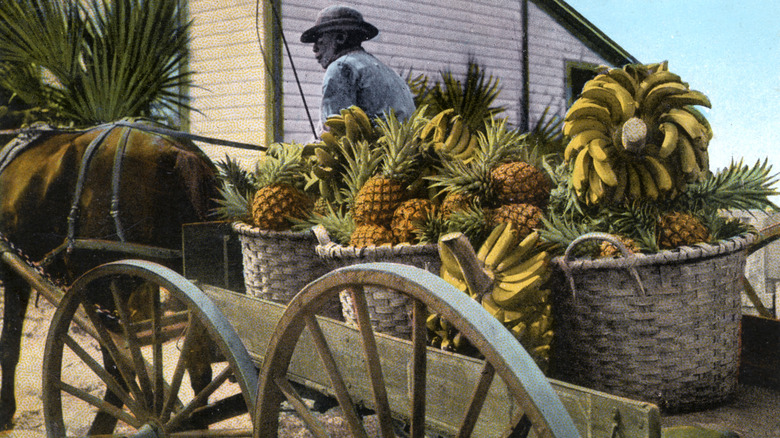Where Did The Comedy Gag Of Slipping On A Banana Peel Come From?
In film and TV, mishaps frequently occur that rarely, if ever, happen in real life. People who live on coffee shop barista salaries don't live in spacious, two-bedroom New York City apartments (see: "Friends"); women don't wake up in the morning with perfect makeup and expertly coiffed hair (every soap opera ever); and crimes aren't committed and prosecuted within the space of a few days (every procedural ever).
Another TV/movie trope that doesn't exist in real life — or at least, not to the extent that it's depicted on film — is the infamous bit where someone slips on a banana peel to comic effect. Ideally, the victim slips so dramatically that their foot flies over their head. More often than not, the gaffe is accompanied by a comedic whistle as a sound effect. But as it turns out, the exact sequence of events required to slip on a banana peel is hard to recreate in real life, as the TV show "Mythbusters" proved in an episode in 2009. Even so, it's hard to deny there was a time when slipping on any given piece of discarded trash on the street was a daily hazard –- and the banana peel may have served as a metaphor for something a little grosser.
The banana peel gag has direct links to old-timey vaudeville
Though the old-school variety circuit hasn't been around for a century now, many of the tropes and techniques — even whole bits that permeate TV and movies — originated from vaudeville. For the uninitiated, "vaudeville" is the collective for the lowbrow live entertainment industry (including burlesque shows and the like) that existed before movies and TV and became a staple of American entertainment from the late 1800s to the early 20th century, per PBS. Vaudeville's impact has been ubiquitous within the sphere of American entertainment. (An example? The bit where a failing act is forcibly removed from the stage in the middle of their vaudeville performance by way of an outsize, offstage hooked cane originated in vaudeville.)
The banana peel gag was invented by vaudevillian "Sliding" Billy Watson, according to The A.V. Club. Rather, Watson claimed he invented it, purportedly after witnessing someone trying and failing to maintain their balance after slipping on one. Other vaudeville comedians incorporated banana-related gags into their own acts, according to Mental Floss – and soon enough, it caught hold. Then motion pictures came along, and the comedic trope was cemented into the popular collective consciousness.
Were banana peels really that much of a hazard?
So, we know that the concept of slipping on a banana peel became a source of comedy around the turn of the century. But was there ever a time when slipping on a banana peel was a real daily hazard? Well ... yes and no. As Food and Wine reported in 2016, bananas entered the American diet in the early 1900s. According to the magazine, inconsiderate Americans would toss the peels on the ground, creating a theoretical slipping hazard. Histrionic teaching materials from the time warned American schoolchildren of men who slipped on banana peels to catastrophic results, like breaking a limb and, as a result, being forced into the poorhouse, as described in the book "Bananas: An American History" (via MentalFloss).
The danger was almost certainly exaggerated, but the anti-banana-peel hysteria took place in the larger context of American streets — ones which were littered with considerably effluvial detritus. According to Today I Found Out, the banana peel was a less-disgusting metaphor for a much-more immediate hazard: horse poop. It was everywhere, and slipping on it was a real possibility. Of course, having someone slip and fall comically on horse manure would have been difficult (and disgusting) to recreate on stage, so in lieu of this, a banana peel worked perfectly well for everyone involved.


